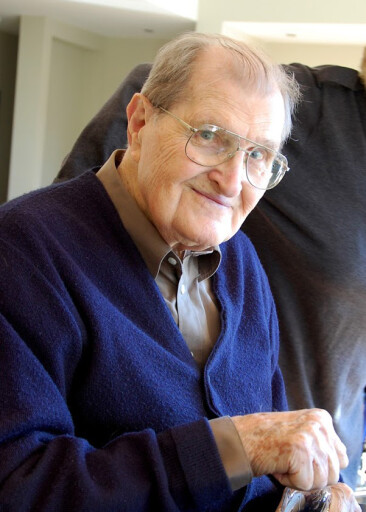

Joe Lill
Joe Lill was born in St. John, Kansas on December 22, 1921. He was the eighth child of John W. and Alice Lill. Thankful for his large family, he wrote with a twist of humor: “Harlan his younger brother and I always felt extremely fortunate our parents had nine children.”When not in school, he worked at his father’s newspaper, The County Capital, at various times as paperboy or linotypist. However, “It wasn’t all work and school, even back then,” he wrote recalling fondly the Saturday afternoons spent watching cowboy movies double features for a nickel. In addition, high school band trips out of state broadened his horizons, he noted, giving him a taste of the wider world.In one college essay he wrote of his desire to travel, a wanderlust that could be “properly considered a vital ingredient of the American blood stream.” It made him “jump at the chance” to become a clerk with the U.S. Legation in Costa Rica in 1943. Soon thereafter, he was drafted into the Army to join legions of other young men sent to war in Europe. In 1945, he met Lilli Bister in the small Bavarian town of Miesbach. Lilli has often said he was the very best representative of his country, this long before he became a Foreign Service officer. His warm smile, openness, deep curiosity and the ease he had of engaging others in conversation opened doors and hearts to him.He remained in Germany for two years after the war ended to stay close to Lilli. He was discharged from the Army in 1946 and became a civilian employee of the Office of Military Government in Munich. They married in 1947 after the “marriage ban” was lifted.Back in the U.S., Joe earned a law degree at the University of Kansas in 1950, thanks to the GI Bill, and was admitted to the bar. When the opportunity arose, Joe and Lilli returned to Germany in 1950 so that he could study law at the University of Munich for a year. Once back at home, he took over the editorship of The Emporia Times in Kansas for three years.But that wanderlust took hold again and he traded in the newspaper business for an appointment with the Foreign Service in 1954. He remained with the State Department for 25 years, living in Palermo, Rome where his daughter, Ava, was born, Jerusalem where his son, Peter, was born, Beirut, Baghdad and Vienna, and then stateside again where his daughter, Susanna, was born. He worked in Washington, D.C. until he retired in 1979.Never one to be idle, he started his own company upon retiring. He also spent many hours in his garden, tending to his vegetables and flowers. Ahead of his time, he spurned the use of herbicides and pesticides. Every insect, every animal, was worthy of consideration and respect, and the reason why he became a vegetarian. By his example, he taught his children a deep reverence for the natural world and that it was theirs to protect and nurture.Joe also spent many years as a volunteer teaching English to newly-arrived immigrants. He took advantage of retirement to research his genealogy, pouring over letters and documents to piece together the story of the Lill and Kennedy families. This project was greatly aided by the research begun by his older brother, John.His early exposure to the printed page may have been the seed of a lifelong love of language and of the written word. He was forever with his daily crossword puzzle or in later years, ensconced in his easy chair, with a tower of books beside him. He was a strict grammarian, often to the dismay of his children. From Shakespeare to Coleridge to Frost, he would recite favorite poems and passages from memory. Joe’s much-anticipated annual Christmas poem compiled family news in rhyming couplets or quadruplets, always accompanied by photographs of an ever-expanding circle of grandchildren.Joe loved music and could be found armchair conducting his favorite symphonies by Brahms, Schubert or Rachmaninoff, hands raised and in motion, his eyes closed in concentration. He also liked to sing standards from the Glen Miller era or songs by Peggy Lee. Living room concerts by his grandchildren on the cello, piano or guitar made him particularly proud.Kind and compassionate, Joe was a defender of the underdog, the underprivileged, and the forgotten. His political leanings tended to the side that championed “the common man over the man of privilege.”Not all was politics and poetry, though. His spirits rose and fell with the fortunes of his beloved KU Jayhawks and of his hometown teams, the ‘Skins and the Nationals. However, nearly any ballgame was a good ballgame whether the ball rolled, bounced or flew.Joe had a great sense of humor and loved even the silliest slapstick. He had the most wonderful, gentle laugh and he was humble and self-deprecating to a fault. His absence creates an unfillable void for those left behind, but his life and example were a lesson in how to be, and do, better.Joe died on March 4 surrounded by his family. His remains will be interred at Arlington National Cemetery in August, during a private family ceremony. He is survived by his wife, Lilli; their three children, Ava Dahlstrom Warren, Peter Ania, and Susanna Rodrigo Abela; and seven grandchildren, Peter Dahlstrom, Alexandra Dahlstrom, Natalie Dahlstrom, Isabella Lill, Sophia Lill, Sofia Abela, and Antonio Abela.
Service Schedule
Past Services
Guestbook
Visits: 23
This site is protected by reCAPTCHA and the
Google Privacy Policy and Terms of Service apply.
Service map data © OpenStreetMap contributors



